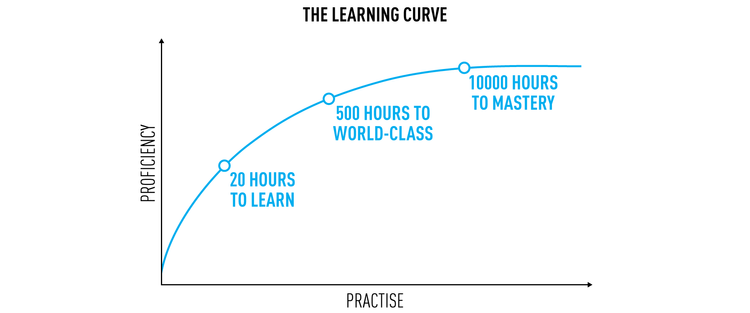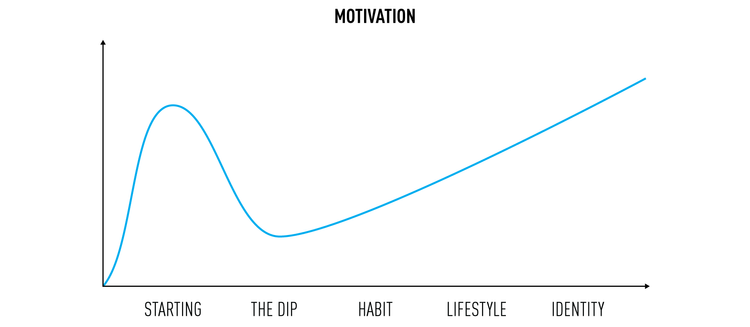The Science And Statistics Of Goal Setting
The beneficial effect of goal setting on task performance is one of the most robust and replicable findings in the psychological science [1]. Despite this, only a minority of people actually set goals, and even fewer achieve them.
Goal setting statistics
Surveys show that about 40% people set goals, and only about 5% achieve them. This means that there's roughly a 10% success rate of goal setting. It is worth noting that out of the people who actually write down their goals, the success rate is far higher than people who's goals are just in their heads.

New year's resolutions
Surveys and data show that the drop-out rate of new year's resolution is extremely steep at the beginning of the year. The running app Strava even coined January 19th the quitters day. On the other hand, this means that if you manage to stick to your new years resolutions for the first 6 months, you are quite likely, statistically speaking, to make it to the end of the year as well.

Goal setting science
Hundreds of studies done have revealed many details about the right way to go about setting goals. Several goal-setting frameworks have been developed, such as the G-R-O-W model from the United Kingdom and the E-E-E model mentioned by the American Psychological Association [2] – But today we’re going to take a look at my favorite: The S.M.A.R.T goal-setting framework.
S – Specific
M – Meaningful
A – Attainable
R – Realistic
T – Time-bound
Specific
“Set your mind on a definite goal and observe how quickly the world stands aside to let you pass.” ― Napoleon Hill, Think and Grow Rich:
Goal should be specific, empirical, and ideally tangible and numerically defined. Success should be measurable, and results should be gauged quantitatively. It’s so important in fact, that Author Doug Smith wrote a book about it: “Make Success Measurable!"
If you don’t know where you want to go, you may end up somewhere you don’t want to be. If you don’t know where you are going, any road will get you there.
Compare “I want to lose weight”, with “I want to lose 20 pounds”. The former is vague and undefined, whereas the latter is specific and numerically defined. Numerical goals are super beneficial, as they keep you accountable and are easily measurable.
Author Peter Drucker is famously quoted as saying “What gets measured gets managed” – and research backs this sentiment [3]. One scientific review proposes a reformulation “what gets talked about gets done, especially if there are numbers.” [4]
Furthermore, most educational institutions today agree that setting clearly defined goals makes it easier for the students to improve their strengths.
Moreover, popular therapeutic practices like the Cognitive Behavioral Therapy and Anger Management often use weekly trackers or charts to record the progress of the clients. Even in child therapies, counselors use mood charts and provide positive reinforcements to the child on accomplishing them.
As we have a clear vision of the end-goals, it becomes easier for us to advance towards them. So begin with the end in mind, and set specific goals.
Meaningful
“He who has a why to live for can bear almost any how.” ― Friedrich Nietzsche
The book “Start with why” mirrors this sentiment exactly, and points out that people like Martin Luther King Jr., Steve Jobs, and the Wright Brothers all started with “why”. In fact, one of the most famous forms of psychotherapy, namely logotherapy, is founded on the belief that meaning is the primary, most powerful motivating and driving force in humans.
Attainable
“Your goal should be just out of reach, but not out of sight.” – Denis Waitley and Remi Witt
Research shows that setting difficult goals lead to higher performance [5]. At the same time, don’t make them too hard, so that you burn yourself out. A lot of top performers actually recommend starting slow, and building up from there. For example:
- IBM salespeople back in the day, were said to have really low quotas. Despite this they were known as some of the most successful sellers in the world. Low quotas led to less performance anxiety, and more room to build general sales-momentum and learn the skills.
- Tim Ferriss recommends writers to only have the goal of writing two crappy pages a day, even if you never use them. Having a goal like that allows you to overshoot your goals and build confidence and gain momentum.
- Mingyur Rinpoche recommends people start a meditation practise slowly. Start small and build up your habit over time.
So how do we reconcile the research and the advice of top performers? I think the best goal-setting involves small everyday goals, but large long-term goals. As Bill Gates famously said:
“Most people overestimate what they can do in one year and underestimate what they can do in ten years.”
Relevant
“A goal should scare you a little and excite you a lot” – Joe Vitale
Your goal should be relevant to your life and worthwhile to achieve. It should be aligned with your values. If it makes you excited about life then it’s a good goal.
Humans have something called The Reticular Activating System (RAS), which is a mechanism in our brain that filters out unnecessary information so the important stuff gets through. In layman terms, call it “Selective focus”. Selective focus sifts through all the information in your environment, and presents only the pieces that are important to you. For example, if you’re learning to speak Spanish, you will start to notice Spanish things everywhere around you. On posters, online, etc. If you pick a goal relevant to your life, your RAS will automatically work in favor of you. You will automatically start focusing on things relevant to your goals.
Time-bound
“The moment you put a deadline on your dream, it becomes a goal.” – Harsha Bhogle
We can borrow common advice used in sales and marketing: “later equals never” – which is to say, if there is no deadline to purchase, it will never get purchased. That’s why we often see “limited time sales”. Time constraints urges people to take action. The same applies to goal-setting. If there’s no deadline to get something done, it will never get done. Goals are dreams with deadlines.
Now that you know how to set goals the smart way…
It’s time to go to work. Goals don’t work unless you do. Discipline is what bridges the gap between goals and accomplishment.
Good luck!





